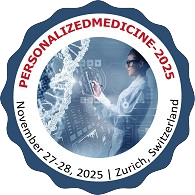Sessions/Tracks
Track 1: Precision Medicine
Precision medicine represents a transformative approach to healthcare that recognizes individual variability in genetics, environment, and lifestyle. By integrating advanced technologies such as genomics, data analytics, and personalized interventions, precision medicine aims to tailor medical treatment and prevention strategies to the unique characteristics of each patient. This approach moves beyond the traditional one-size-fits-all model, emphasizing customization and optimization of healthcare interventions. By considering genetic makeup, environmental exposures, and lifestyle factors, precision medicine seeks to improve treatment outcomes, minimize adverse effects, and enhance patient satisfaction. It holds promise for revolutionizing healthcare delivery by delivering more precise and effective therapies while reducing healthcare costs in the long run.
Track 2: Genomics
Genomics is a multidisciplinary field that investigates the structure, function, and evolution of genomes, encompassing an organism’s entire DNA, including genes and non-coding sequences. The advent of high-throughput sequencing technologies has revolutionized genomics, enabling researchers to analyze entire genomes efficiently and affordably. Genomics plays a crucial role in understanding the genetic basis of diseases, identifying genetic variations associated with health conditions, and predicting individual responses to treatments. By unraveling the complexities of genetic interactions, genomics contributes to advancements in personalized medicine, precision healthcare, and targeted therapies. It holds immense potential for unlocking new insights into human biology, disease mechanisms, and therapeutic interventions.
Track 3: Personalized Healthcare
Personalized healthcare, synonymous with precision medicine, redefines traditional approaches to medical care by considering individual variations in genetics, environment, and lifestyle. It emphasizes customization and optimization of healthcare interventions to meet the unique needs of each patient. Personalized healthcare integrates various data sources, including genomic information, biomarkers, and patient preferences, to deliver precise and effective therapies. By tailoring treatments to individual characteristics, personalized healthcare aims to improve treatment outcomes, reduce adverse effects, and enhance patient satisfaction. This patient-centric approach holds promise for revolutionizing healthcare delivery, empowering patients to actively participate in their care, and improving overall health outcomes.
Track 4: Pharmacogenomics
Pharmacogenomics explores how an individual's genetic makeup influences their response to drugs, aiming to predict drug efficacy, adverse reactions, and optimal dosing regimens. By analyzing genetic variations associated with drug metabolism, pharmacogenomics helps healthcare providers tailor medication regimens to each patient's genetic profile. Pharmacogenomic testing can identify genetic markers that affect drug metabolism pathways, enabling personalized dosing recommendations and treatment optimization. This precision approach to prescribing medications has the potential to minimize adverse drug reactions, improve treatment efficacy, and enhance patient safety. Pharmacogenomics represents a paradigm shift in drug therapy, moving towards more personalized and effective treatments based on individual genetic differences.
Track 5: Biomarkers
Biomarkers are measurable indicators of biological processes, health states, or disease conditions in the body. They encompass a wide range of molecules, genes, proteins, cells, or imaging characteristics that reflect normal or abnormal physiological changes. Biomarkers play essential roles in disease diagnosis, prognosis, treatment monitoring, and drug development. For example, specific biomarkers may indicate the presence of cancer, predict disease progression, or assess treatment response. By identifying and measuring biomarkers, healthcare providers can make more informed clinical decisions, tailor therapies to individual patients, and improve patient outcomes. Biomarkers serve as valuable tools in advancing personalized medicine, precision healthcare, and targeted therapies for various diseases and conditions.
Track 6: Genetic Testing
Genetic testing involves analyzing an individual's DNA to identify variations or mutations associated with inherited diseases, susceptibility to certain conditions, or response to treatments. It encompasses various techniques, such as DNA sequencing, genotyping, and molecular diagnostics, to examine specific genes or entire genomes. Genetic testing can help diagnose genetic disorders, assess disease risk, guide treatment decisions, and inform preventive measures. With advancements in technology and decreasing costs, genetic testing has become more accessible and integrated into clinical practice, enabling personalized approaches to healthcare delivery. Genetic testing holds promise for improving disease prevention, early detection, and personalized treatment strategies tailored to individual genetic profiles.
Track 7: Targeted Therapies
Targeted therapies are medical treatments that selectively target specific molecules or pathways involved in disease progression, offering more precise and effective interventions compared to conventional therapies. Unlike broad-spectrum treatments that may affect both healthy and diseased cells, targeted therapies aim to inhibit or block specific molecular targets associated with disease pathogenesis. These therapies are often based on genetic or molecular characteristics of tumors or other diseases, allowing for personalized treatment approaches. Targeted therapies have revolutionized the treatment of various cancers, autoimmune disorders, and genetic conditions, offering improved outcomes and reduced side effects compared to traditional treatments. They represent a paradigm shift towards precision medicine and personalized healthcare, emphasizing individualized treatment strategies based on molecular insights.
Track 8: Data Analytics
Data analytics involves the process of analyzing large volumes of data to uncover patterns, trends, and insights that can inform decision-making and improve outcomes. In healthcare, data analytics encompasses the use of advanced statistical and computational techniques to extract knowledge from clinical, genomic, demographic, and other healthcare-related data sources. By leveraging data analytics, healthcare providers can enhance clinical decision support, optimize resource allocation, identify population health trends, and improve patient outcomes. Data analytics plays a critical role in precision medicine, personalized healthcare, and population health management, enabling evidence-based practice and continuous quality improvement. It holds promise for transforming healthcare delivery, driving innovation, and optimizing healthcare systems to meet the evolving needs of patients and populations.
Track 9: Telemedicine
Telemedicine refers to the use of telecommunications technology to deliver healthcare services remotely, allowing patients to consult with healthcare providers and receive medical care without physically visiting a clinic or hospital. Telemedicine encompasses a wide range of services, including virtual consultations, remote monitoring, telehealth platforms, and mobile health applications. It enables healthcare providers to reach patients in remote or underserved areas, improve access to specialty care, and enhance convenience for patients. Telemedicine has become increasingly important, especially during public health emergencies like the COVID-19 pandemic, facilitating continuity of care while minimizing exposure risks. It holds promise for expanding access to healthcare, improving health outcomes, and enhancing patient experiences in a digitally connected world.
Track 10: Electronic Health Records (EHRs)
Electronic Health Records (EHRs) are digital versions of patients' medical records that contain comprehensive information about their health history, diagnoses, treatments, medications, and laboratory results. EHRs facilitate the storage, retrieval, and sharing of patient information among healthcare providers within a healthcare organization or across different healthcare settings. They support clinical decision-making, care coordination, and continuity of care by providing real-time access to relevant patient data. EHRs also offer features such as electronic prescribing, clinical documentation, and decision support tools to enhance efficiency and quality in healthcare delivery. By replacing paper-based records with digital systems, EHRs improve accessibility, interoperability, and security of patient information, leading to more coordinated and patient-centered care.
Track 11: Artificial Intelligence (AI)
Artificial Intelligence (AI) in healthcare refers to the application of advanced computational algorithms and machine learning techniques to analyze complex medical data, make predictions, and support clinical decision-making. AI-powered systems can interpret medical images, extract insights from electronic health records (EHRs), assist in diagnosing diseases, predict patient outcomes, and personalize treatment plans. By automating repetitive tasks, identifying patterns in data, and providing decision support, AI has the potential to improve diagnostic accuracy, optimize resource utilization, and enhance patient care outcomes. As AI continues to evolve, it holds promise for transforming healthcare delivery, driving innovation, and addressing complex challenges in disease management and population health.
Track 12: Pharmacogenetics
Pharmacogenetics explores the influence of genetic variations on an individual's response to drugs. It examines how genetic factors affect drug metabolism, efficacy, and toxicity, leading to variability in drug responses among patients. Pharmacogenetic testing can identify genetic markers associated with drug metabolism pathways, allowing healthcare providers to personalize medication regimens based on individual genetic profiles. By tailoring drug selection, dosage adjustments, and treatment strategies to genetic factors, pharmacogenetics aims to optimize therapeutic outcomes, minimize adverse drug reactions, and improve patient safety. It represents a key component of precision medicine, enabling more personalized and effective pharmacotherapy approaches tailored to individual genetic differences.
Track 13: Disease Prevention
Disease prevention encompasses a range of interventions aimed at reducing the incidence, prevalence, and impact of diseases within populations. It includes primary prevention strategies to prevent disease occurrence, secondary prevention efforts to detect and treat diseases early, and tertiary prevention initiatives to minimize complications and disabilities. Disease prevention strategies may target modifiable risk factors such as unhealthy behaviours, environmental exposures, and genetic predispositions. By promoting health education, vaccination programs, screening tests, and public health interventions, disease prevention aims to improve population health outcomes, reduce healthcare costs, and enhance quality of life. It represents a proactive approach to healthcare that emphasizes health promotion, early detection, and intervention to prevent the onset or progression of diseases.
Track 14: Patient-Cantered Care
Patient-cantered care is an approach to healthcare delivery that prioritizes the individual needs, preferences, values, and goals of patients. It emphasizes active collaboration between patients, families, and healthcare providers in decision-making, treatment planning, and care delivery. Patient-centred care encompasses aspects such as shared decision-making, respect for patient autonomy, communication, empathy, and cultural sensitivity. By focusing on the whole person and their unique circumstances, patient-cantered care aims to improve patient satisfaction, engagement, adherence to treatment, and health outcomes. It fosters a therapeutic relationship built on trust, mutual respect, and shared decision-making, ultimately enhancing the quality and effectiveness of healthcare delivery.
Track 15: Clinical Trials
Clinical trials are research studies that investigate the safety, efficacy, and effectiveness of medical treatments, interventions, or diagnostic procedures in humans. They are essential for advancing medical knowledge, developing new therapies, and improving healthcare outcomes. Clinical trials may involve testing new drugs, medical devices, behavioural interventions, or preventive measures in controlled settings under rigorous scientific protocols. They progress through several phases, from initial safety assessments in small groups of volunteers to large-scale trials involving diverse populations. Clinical trials adhere to ethical and regulatory standards to ensure participant safety, informed consent, and scientific integrity. They play a crucial role in translating scientific discoveries into tangible benefits for patients and communities, driving innovation and evidence-based practice in healthcare.
Track 16: Digital Health
Digital health encompasses the use of digital technologies, information, and communication systems to support healthcare delivery, health education, research, and monitoring. It includes electronic health records, mobile health apps, wearable devices, telemedicine platforms, and health information systems. Digital health solutions enable remote monitoring of patients, self-management of chronic conditions, real-time health data collection, and virtual consultations with healthcare providers. By leveraging digital technologies, healthcare organizations can improve access to care, enhance patient engagement, and optimize health outcomes. Digital health holds promise for transforming healthcare delivery, driving innovation, and empowering patients to take control of their health in a digitally connected world.
Track 17: Health Equity
Health equity refers to the absence of unfair and avoidable disparities in health outcomes and access to healthcare services among different population groups. It encompasses social, economic, and environmental factors that influence health disparities, such as income inequality, education, housing, employment, and access to healthcare resources. Achieving health equity requires addressing systemic barriers and structural determinants of health to ensure that all individuals have the opportunity to attain their highest level of health. Health equity initiatives focus on reducing health disparities, promoting social justice, and improving the health outcomes of marginalized and underserved populations. They advocate for policies and interventions that address social determinants of health and promote equitable access to healthcare services and resources.
Track 18: Translational Research
Translational research is the process of translating scientific discoveries from basic research into clinical applications and healthcare interventions. It bridges the gap between laboratory findings and clinical practice, translating knowledge from bench to bedside. Translational research encompasses various stages, including preclinical studies, clinical trials, implementation science, and dissemination of evidence-based practices. It aims to accelerate the translation of research findings into tangible benefits for patients, communities, and public health. By fostering collaboration between researchers, clinicians, industry partners, and policymakers, translational research facilitates the development of innovative therapies, diagnostics, and preventive strategies. It plays a vital role in advancing precision medicine, personalized healthcare, and population health, driving innovation and improving healthcare outcomes.
Track 19: Lifestyle Medicine
Lifestyle medicine is an evidence-based approach to preventing, treating, and managing chronic diseases by addressing lifestyle factors such as diet, physical activity, sleep, stress management, and substance use. It emphasizes the importance of healthy behaviours and environmental factors in promoting optimal health and well-being. Lifestyle medicine interventions may include dietary modifications, exercise prescriptions, behaviour change strategies, stress reduction techniques, and smoking cessation programs. By empowering individuals to make healthy choices and adopt sustainable lifestyle habits, lifestyle medicine aims to prevent and reverse chronic conditions, reduce healthcare costs, and improve quality of life. It represents a holistic approach to healthcare that addresses the root causes of diseases and promotes long-term health and wellness.
Track 20: Population Health
Population health focuses on improving the health outcomes and well-being of entire populations, communities, or defined groups, rather than just individual patients. It considers the social, economic, environmental, and behavioural determinants of health that influence population health outcomes. Population health initiatives aim to prevent diseases, promote healthy behaviours, and address health inequities through policy, systems, and environmental changes. Strategies may include health education, preventive screenings, vaccination programs, community-based interventions, and public health policies. By taking a holistic approach to health promotion and disease prevention, population health efforts aim to improve the health of diverse populations and reduce health disparities. They advocate for upstream interventions that address social determinants of health and promote health equity











